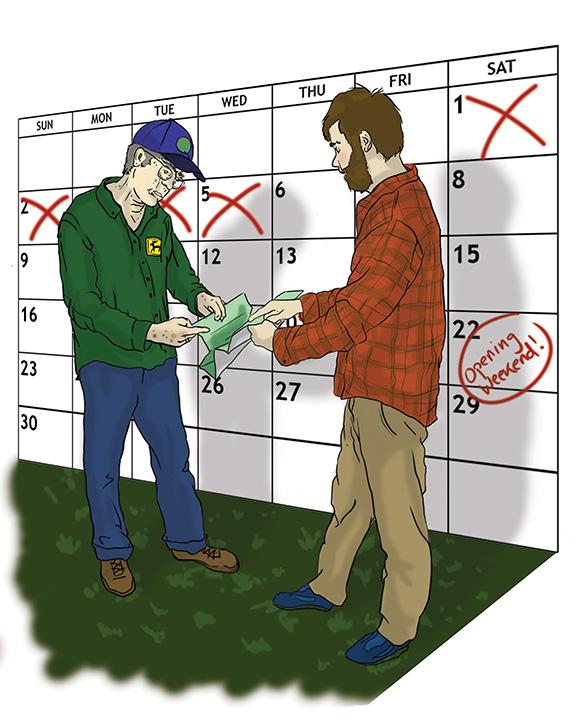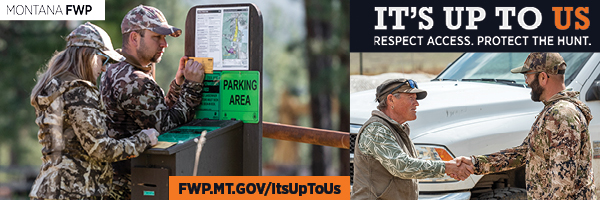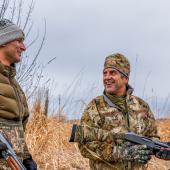Be a Good Neighbor
Asking for permission to hunt on private land.
As a Montana rancher, I’ve been fielding requests for permission to hunt our acreage for over 50 years. Sometimes I give it and sometimes I don’t.
Often the reason is obvious. A big SUV pulled into our driveway a few years back, loaded with half-a-dozen hunters wearing blaze orange. A guy in the back seat rolled down his window and addressed my wife, Emily, who was doing her barn chores, with, “Hey, honey!” I’ll leave her response to your imagination.
Thankfully, we’ve had far more pleasant experiences, many of them resulting in us granting permission. Below I’ve assembled a list of permission-asking dos and don’ts that apply to our property and, I suspect, would produce similar results on other ranchlands across Montana.
DO
- Ask early, preferably weeks or even months before hunting season.
- Make your request in person if possible, rather than by telephone, unless you already know the rancher. Asking by email or in a letter is second best.
- Visit the ranch in non-hunting garb.
- Be polite and friendly, but it’s okay to be a tad persistent. If the rancher doesn’t give you an emphatic “No!”, there may be hope.
- Know who owns the land you want to hunt and where the boundaries end. You’ll embarrass yourself by asking a rancher for permission to hunt on land that’s not his or hers.
- Show interest in the rancher’s operation, but don’t feign knowledge you don’t have.
- Detail exactly who will be hunting. You alone—and stick to this—is best. You and one other is often okay. But a fired-up foursome? No.
- Mention (if you do) that you hunt with primitive or traditional tools (longbow, lever-action rifle, etc.), as this can be a plus in some ranchers’ eyes.
- Offer to help with ranch work; fencing is one area where ranchers often welcome help.
- Find common ground with ranchers and farmers. Social interaction through a club, organization, or church is a plus.
DON’T
- Cruise roads during hunting season, spot game, then ask at the nearest ranch or farm house for permission to hunt. You should have done your scouting and asking weeks before.
- Drink and hunt. Any evidence of alcohol consumption—odor, behavior, beer cans on the dash—is cause for immediate refusal.
- Ask on Sundays, particularly in the morning.
- Show up with mud-splattered trucks or ATVs. To ranchers and farmers, that mud likely means you’ve been off-road making ruts and spreading invasive species—the last thing they want on their property.
- Act as if you’re doing the rancher a favor by offering to “thin out” the game animals on his or her place. Yes, whitetails consume a good share of my alfalfa, but I still like and admire the animals.
- Display firearms that may be intimidating. A “black rifle” hanging in the window of your pickup may connote combat to some landowners.
IN THE FIELD
- So you’ve done everything right, and a rancher or farmer has opened that gate a crack. But like a new employee, you’re only on probation. Whether you’ll be welcomed back depends on how you treat the owner and the land.
- Don’t show up with additional hunters. If you’ve received permission, consider it a treasure, but not one you can share.
- Obey any of the rancher’s bag restrictions, even those more stringent than what your license allows. If the rancher asks that you shoot cow elk only, honor that request.
- Drive as little as possible. Any vehicle or ATV use must be approved in advance.
- Unless otherwise instructed, leave gates as you find them.
- Never litter, even so much as a gum wrapper.
- Check back with the rancher on your way out. He or she will want to know how you did, what you saw, and if you spotted anything suspicious.
- Once you get home, whether you took game or not, send the landowner a note of appreciation. If you want to give a bit more, you can never go wrong with a gift card for a local restaurant.
Finally, when asking permission to hunt on private property, keep in mind what Emily and I say about our life on land that’s been in her family since the 1890s: We don’t live in our rather modest house; we live on the ranch. Every pasture, coulee, and patch of woods is another room in our house. When you ask to hunt on our ranch, you’re asking to come into our home and seek game with a deadly weapon. Everything you can do to create trust bodes well for your chances of success, both in asking permission and, if receiving it, being welcomed again.






